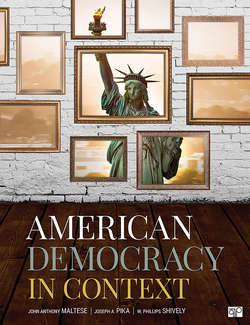Читать книгу American Democracy in Context - Joseph A. Pika - Страница 149
На сайте Литреса книга снята с продажи.
Discovering the Right of Privacy
ОглавлениеThe Supreme Court first established a constitutional right of privacy in Griswold v. Connecticut (1965).94 By a 7–2 vote, the Supreme Court struck down a Connecticut law that made it a crime for anyone, including married couples, to use any form of birth control. In his opinion for the Court, Justice Douglas argued that this law violated the right of privacy of married couples (it took a future case to extend this constitutional protection to unmarried couples).95
Where did this right of privacy come from? Douglas argued that it was implied by specific language in the Bill of Rights. He noted that the First Amendment’s guarantee of free speech and assembly protects the freedom to associate and implies a right of privacy in one’s associations. The Third Amendment’s prohibition against quartering soldiers in any house in time of peace without the permission of the owner suggests a zone of privacy against government intrusion. So, too, does the Fourth Amendment’s ban on unreasonable searches and seizures and the Fifth Amendment’s ban on self-incrimination. The Ninth Amendment clearly states that the failure to enumerate a specific right does not mean that it does not exist. Finally, the Fourteenth Amendment allows for fundamental rights to be incorporated. Taken together, Douglas argued that these specific provisions imply a zone of privacy broad enough to protect the marital bedroom from government intrusion and fundamental enough to apply to the state of Connecticut.
Not all the justices agreed with Douglas. Some thought the right of privacy was even more expansive than Douglas admitted, but signed on to his decision. Others strongly rejected any right of privacy. Hugo Black dissented even though he admitted that the Connecticut law was “every bit as offensive to me as it is to my Brethren of the majority.”96 But Black was a literalist, and he looked in vain for a specific constitutional clause that the law violated. “I like my privacy as well as the next one,” Black wrote, “but I am nonetheless compelled to admit that government has a right to invade it unless prohibited by some specific constitutional provision.”97
